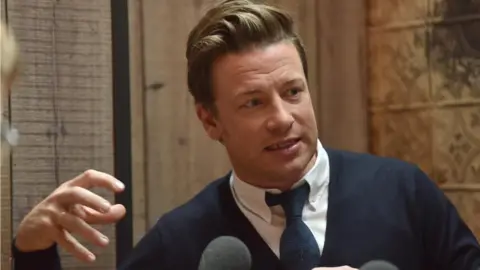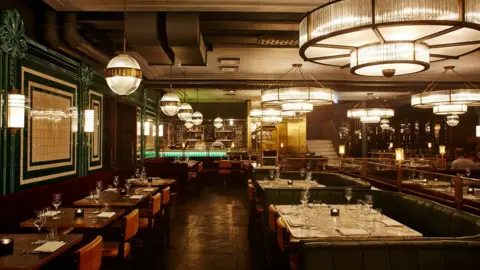Jamie Oliver in talks to sell Barbecoa restaurants
 BBC
BBCCelebrity chef Jamie Oliver is considering selling his Barbecoa steakhouses, his company has confirmed.
Barbecoa was set up by Jamie Oliver and his friend American barbecue expert Adam Perry Lang in 2011.
It has two outlets in London: Piccadilly and St Paul's.
Jamie Oliver Restaurant Group said: "We have instructed a firm of real estate experts to ascertain the potential value and market suitability of two of our sites."
If the restaurants are sold, 160 jobs will be affected, according to the Telegraph.
Mr Oliver relaunched the Piccadilly branch of Barbecoa in February 2017.
Rescue plan
The company is already cutting costs in other areas, in spite of the celebrity chef himself putting £3m of his own money into the business in December.
Last month it announced that it was shutting down 12 of its 37 Jamie's Italian restaurants - the mainstay of the group - as part of a rescue plan with creditors that would enable it to continue trading.
The closure of the 12 restaurants will affect at least 200 jobs.
 Barbecoa
Barbecoa Court documents revealed that Jamie's Italian had debts of £71.5m.
These included:
- £2.2m in wages owed to staff
- £30.2m of overdrafts and loans
- £41.3m owed to landlords, HM Revenue and Customs, suppliers and other creditors
However, £47m of the debts are covered by loans from HSBC Bank and Jamie Oliver's other companies.
The chain also closed down six Jamie's Italian restaurants in January 2017.
At the time, the company said that the closures were due to uncertainties caused by Brexit and a "tough" market.
'Tough market'
Other British restaurant chains have been struggling in recent months.
In January, the struggling burger chain Byron announced that it too had entered into a company voluntary arrangement, which would mean that up to 20 Byron burger restaurants would need to close.
KPMG, the accounting firm handling the restructuring, said that employees, suppliers and business rates would continue to be paid on time and full.
Roger Tejwani, head of consumer sector at stockbrokers Finncap, told the BBC that there are now just too many restaurants.
"There is too much capacity in the market with consumers having a considerable amount of choice," he said.
"They are all competing against each other and other forms of entertainment."